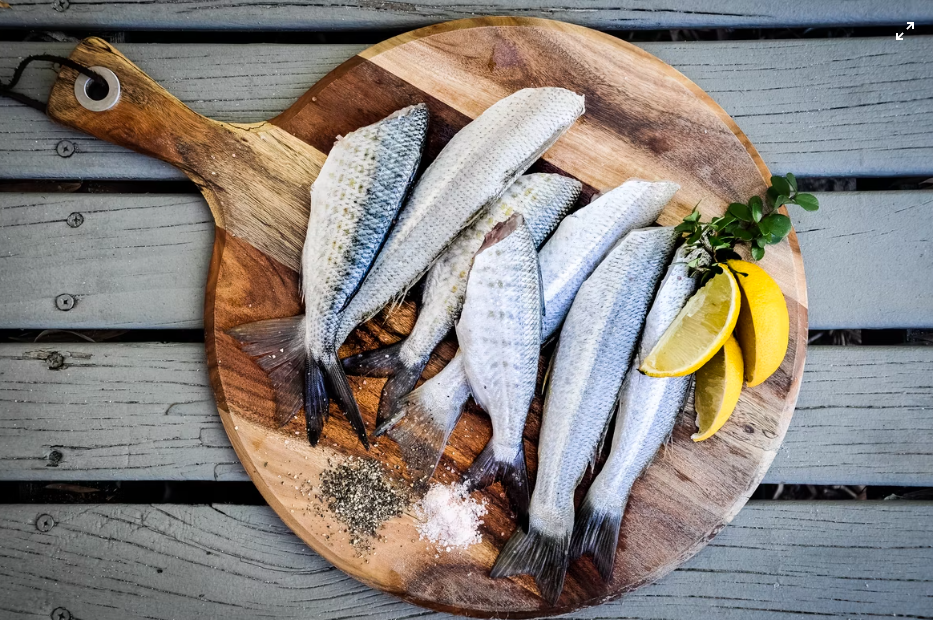It’s no secret that making sustainable fish and seafood choices can be challenging. And if you live inland or in a land-locked area, these decisions can become even more confusing—and expensive! With transportation costs skyrocketing and inflation adding more economic pressure, sourcing lean, blue proteins for your home can seem like more trouble than it’s worth.
But, as frustrating as this can be, there’s hope! The quality of frozen seafood is better than ever, and the tinned seafood movement has added much-needed diversity to our sustainable seafood options. Plus, even though fish and seafood can be a more expensive option at the store, a little really does go a long way. If you keep your portion sizes smaller and add more grains and vegetables to your plate, you’ll be able to stretch your protein dollar and still have an impact!
Here are four ways to buy sustainable seafood when you don’t live on the coast:
- Bulk Frozen Packs:
Bulk frozen is one of the fastest growing categories in fish and seafood—and I am grateful for it! The quality of the fish is extremely high and the prices are lower because these packs are transported by ground or sea instead of by air, giving them a lower carbon footprint.
Other advantages to buying bulk frozen include fish with a year-long shelf life, being able to thaw exactly what you need for each meal (creating lower waste), and the ease of cooking from frozen (if you like salmon, you can try this pack from Fair Trade Certified salmon farm, Kvaroy Arctic). The only drawback is that certain delicate fish like sole can seem watery or mushy after cooking. But, you can avoid this outcome by making sure you dry the fish well prior to cooking, and steaming it instead of pan-frying.
- Tinned and Canned:
I’m very excited that there are so many companies producing high-quality tinned and canned seafood right now (one of my personal favorites is Fishwife). Keeping canned clams in my Sea Pantry for a quick pasta, or tinned mackerel to sprinkle over a rice dish, ensures I can make dinner at a moment’s notice.
It might not seem like it, but producing tinned and canned seafood isn’t a modern phenomenon—we’ve actually been canning seafood for nearly 200 years! In 1830s Scotland, canning was used to keep fish fresh until it could be brought to market. By the 1840s, salmon was being canned in Maine and New Brunswick. Commercial salmon and sardine canneries had their origins in California and in the northwest U.S., particularly on the Columbia River.
While the flavors of tinned seafood are strong for some palates, and the price may seem high, again, a little goes a long way. If you trust the producer, tinned and canned seafood is often one of your most sustainable purchasing options—and there are SO many brands worth exploring.
- Smoked:
Smoked salmon has long been a pantry favorite for many, but in land-locked areas, it can be the most accessible choice for nutritious, sustainable seafood. Smoked fish has a longer shelf life than fresh fish, and can be used in so many things, including pastas, eggs, sandwiches, salads, and more! One of my personal favorites is Kvaroy Arctic Smoked Salmon (available on Amazon). But, don’t be afraid to get adventurous and try other species like trout or other white fish as well.
- Fresh:
While fresh fish isn’t the obvious choice for our inland dwellers, in reality, delicious fresh fish and seafood are available through well-traveled distribution and transportation routes.
Be aware that your carbon footprint will be higher to get this fish to you, and the cost will be commensurate with that effort. You’ll also want to ask questions about when the fish arrived and from where it was sourced, but you’ll for sure be satisfied with the quality and taste.
You can also make a positive impact by supporting local freshwater fish farms and fisheries. In most areas of the country, trout farmers deliver regularly to your local grocer!
By using the above tips to get sustainable seafood when you don’t live on the coast, you can be sure you’ll have access to delicious, sustainable fish no matter where you dwell.

